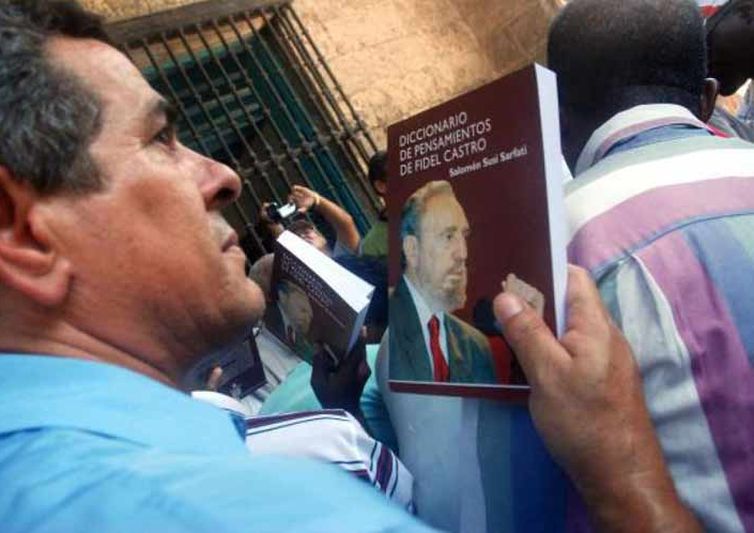
Ángel Santiesteban, Havana, 23 February 2019 — They slammed shut the doors of La Cabaña, ending the 28th Havana Book Fair; and one which, I suppose, has been the most disturbing of all of them up until now. I can imagine everything those culture officials had to do to prepare an event scheduled for the same month as the widely-publicised constitutional referendum.
One week after the end of the public holiday, Cubans will be invited to ratify the constitutional monster, on which the government had wasted miles and miles of paper, and rivers of ink, sufficient to be able to print an infinite number of headlines, and indeed the entire output of the national press for a whole year. All in order to indoctrinate the Cuban people, and to demand that they legitimise an eternity of communism in Cuba.
The poor Cuban reader, who waits every year for that event which hardly shows any books and which silences the great writers around here and world-wide. The Censorship Fair, in its capital, Havana, slammed its doors and started its follow-up fanfares in the provinces, with identical procedures and the same limitations.
This was the same as all the ideas which came out of Fidel Castro’s head, who, although he didn’t achieve it, dreamed of making the International Book Fair into the most important literary event in the world, more important than the ones in Frankfurt, Buenos Aires or Guadalajara. Nevertheless, in contrast to the other ones, the Fair in Havana had to face up to the real essence of these very diverse events, where you can even trade those monstrous editions of his collected speeches and interviews, which is the sign of true democracy.
This fair felt the weight of the upcoming constitutional referendum on its shoulders. Many books arrived hot off the press into the hands of their readers because all the publishers in the country were churning out hundreds of thousands of copies of the Constitution and all its accompanying bells and whistles.
This got in the way of all those books which should have been on display on opening day. But, nevertheless, all the officials said it was a success. And Alpidio Alonso, that Minister so distanced from the arts and culture, but offensively titled Minister of Culture, will have passed a trial by fire.
The Fair had to go ahead, and could not be set back by anything, not even the devastating tornado which hit Havana. Everything had to go ahead, whatever else was happening; the march for Martí’s birthday, the Fair, and everything that would show just how great, cultured and revolutionary Cuba was. And the Fair finished, with tributes to the official writers, the ones who dance to the tune of this non-government.
Havana’s fair has now closed, and the city will continue in its sad misery, with its hundreds of thousands of inhabitants who have no interest in opening a book, unless they have run out of toilet paper. The fair closed, and, with it, the tributes to the obedient writers, and the rent-a-claque of professional applauders. The doors of the fair have closed in Havana, but others will follow, with the same crap, the same arrogance and the same callousness.
But this Fair was also, in spite of the attentiveness of G2 (the State Intelligence Agency) a scene of political confrontation. One writer, taking part in a presentation, ripped off her shirt and revealed her sweater with its written message to say “No” to the Constitution.
This was met by the usual repression and hate: they harassed and insulted her; they turned violent and furious, pulled her hair, and hit her, by way of bringing to a close the proceedings and making it quite clear in passing what might happen the following Sunday, when more than a few people will say “No” to the Castro farce.
ABOUT THE AUTHOR
 Ángel Santiesteban
Ángel Santiesteban
(Havana, 1966). Graduate in Film Direction, living in Havana, Cuba. Honorable Mention in Juan Rulfo Competition (1989), National Writers’ Association UNEAC Prize (1995). The book: Dream of a Summer’s Day, was published in 1998. In 1999 winner of the César Galeano prize. And the Alejo Carpentier Prize in 2001, organised by the Cuban Book Institute, with a set of stories: The Children Nobody Wanted. In 2006, he won the Casa de las Americas Prize in the stories genre with Happy are Those Who Mourn. In 2013, he won the International Franz Kafka Novels From the Drawer Prize [given in tribute to novels that are written, but then shoved to the back of a drawer rather than published], organised in the Czech Republic, with the novel The Summer When God Slept. He has published in Mexico, Spain, Puerto Rico, Switzerland, China, England, the Dominican Republic, France, the USA, Colombia, Portugal, Martinique, Italy, Canada, among other countries.
Translated by GH
